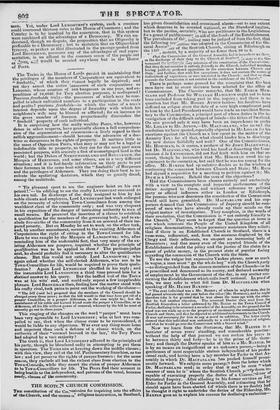" 'Tis pleasant sport to see the engineer hoist on
his own petard l."--•tis edifying to see the crafty LYNDHURST ensnared in his own toil. In discharge of the duty assigned to him by his noble clients and employers, Lord LYNDHURST last week enlarged on the necessity of selecting Town-Councilmen from among the wealthiest class of the community only ; and was very eloquent in his exposition of the danger of intrusting authority to men of small means. He procured the insertion of a clause to establish a qualification for the members of the governing body, and to ex- clude five-sixths of the community from it on account of their im- puted poverty. But on Monday he set to work on the other tack, and, by another amendment, secured to the existing Aldermen of Corporations the right of sitting in the Town-Council for life. Here he was caught by the Marquis of LANSDOWNE; who, after reminding him of the undeniable fact, that very many of the ex- isting Aldermen are paupers, inquired whether the principle of qualification was to be applied to them 9 The partisan judge said, he should probably find it necessary to alter the qualification clause. But this would not satisfy Lord LANSDOWNE; who again asked whether the self-elected Aldermen, who are to be Town-Councillors for life, would be required to prove their quali- fication? Again Lord LYNDHURST shuffled in his reply ; and the inexorable Lord LANSDOWNE a third time pressed him for a distinct answer to his query. But the baffled tool of the Tories was at his wits' end, and could only repeat a few inapplicable phrases. Lord BROUGHAM then, finding how the matter stood with his crafty rival, took pains to point out the working of the clause— "The bill (said he) proposed that the members of the Council should be changed every three years; so that the bill would in that time have got rid of a pauper Councillor, or a pauper Alderman, as the case might be; but the amendment of his noble and learned friend made the pauper a Councillor, or an Alderman, all his life without power of removal, whereas by the bill he must of necessity go out in three years."
This ringing of the changes on the word "pauper" must have been very agreeable to Lord LYNDHURST; who at last was com- pelled to say, that when the clause came to be reconsidered, it would be liable to any objections. Was ever any thing more lame and impotent than such a defence of a clause which, on the authority of their "counsel learned in the law," the Tory Peers had adopted by a vast majority?
The truth is, that Lord LYNDHURST adhered to the principles of his party, though he blundered sadly in attempting to put them in operation. The Tories aim at keeping down the middle classes ; with this view, they rail at the 101. Parliamentary franchise, as too low; 'and yet preserve the rights of pauper freemen : for the same reason, they exclude all but the richest class from election to the Town-Couriciis, while they assert the claim of pauper Aldermen to be Town-Councillors for life. The Peers find their account in being hostile to the independent, and patrons of the venal, because needy, classes of the community.


























 Previous page
Previous page